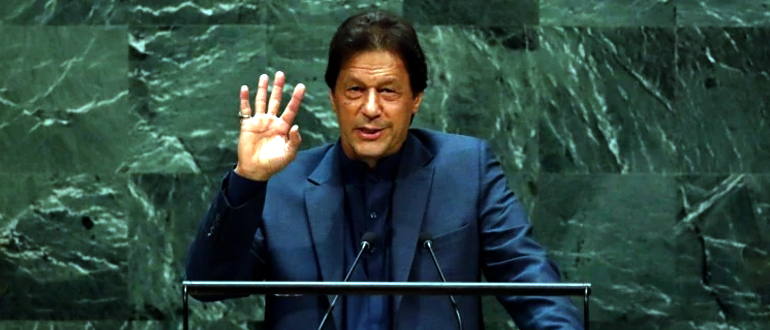Geneva: Pakistan Prime Minister Imran Khan warned on Friday there would be a bloodbath when India lifts its curfew in Kashmir and that any all-out conflict between the two nuclear-armed nations would reverberate far beyond their borders.
Khan made the remarks in an impassioned speech to the annual United Nations General Assembly after India last month removed the decades-old autonomy in the part of Kashmir controlled by Pakistan.
“If this goes wrong, you hope for the best but be prepared for the worst,” Khan said.
“If a conventional war starts between the two countries … anything could happen. But supposing a country seven times smaller than its neighbor is faced with the choice – either you surrender or you fight for your freedom till death?
“What will we do? I ask myself this question … and we will fight. … and when a nuclear-armed country fights to the end, it will have consequences far beyond the borders.”
Indian Prime Minister Narendra Modi in his address to the U.N. assembly shortly before Khan made no mention of Kashmir, or Pakistan, in his speech, concentrating mainly on Indian’s efforts to protect the environment.
What stood out between the two leaders was that Modi spoke for around 17 minutes, well within the allotted time-limit of between 15 to 20 minutes, for a world leader to address the global body.
On the other hand, Imran Khan exceeded beyond the time limit, going on to speak for more than half-an-hour with red light constantly blinking.
Khan, who made his maiden appearance at the UN General Assembly, spoke for over half an hour, well over the allotted time-limit, where he touched upon issues like money laundering, climate change and Islamophobia, apart from raking up the Kashmir issue.
The cricketer-turned-politician used the global platform to continue his anti-India rhetoric, terming the RSS and BJP as “fascist” and “Hindu supremacist”.
Khan addressed the United Nations a day after the senior US diplomat for South Asia called for a lowering of rhetoric between India and Pakistan while saying that Washington hoped to see rapid action by India to lift restrictions it has imposed in Kashmir and the release of detainees there.
This story has been published from a wire agency feed without modifications to the text. Only the headline has been changed.



